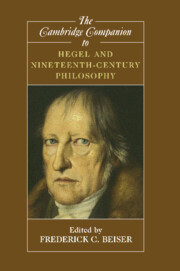Book contents
- Frontmatter
- Introduction: The Puzzling Hegel Renaissance
- 1 Hegel: A Life
- 2 Ancient Skepticism, Modern Naturalism, and Nihilism in Hegel’s Early Jena Writings
- 3 Hegel’s Phenomenology as a Systematic Fragment
- 4 The Independence and Dependence of Self-Consciousness: The Dialectic of Lord and Bondsman in Hegel's Phenomenology of Spirit
- 5 Hegel’s Logic
- 6 Hegel’s Idealism
- 7 Hegel and Hermeneutics
- 8 Hegel’s Social Philosophy
- 9 Hegel’s Philosophy of Religion
- 10 Hegel and Mysticism
- 11 Philosophizing about Nature: Hegel’s Philosophical Project
- 12 Hegel’s Criticism of Newton
- 13 The Logic of Life: Hegel’s Philosophical Defense of Teleological Explanation of Living Beings
- 14 Hegel and Aesthetics: The Practice and “Pastness” of Art
- 15 The Absence of Aesthetics in Hegel’s Aesthetics
- Bibliography
- Index
6 - Hegel’s Idealism
Published online by Cambridge University Press: 28 July 2009
- Frontmatter
- Introduction: The Puzzling Hegel Renaissance
- 1 Hegel: A Life
- 2 Ancient Skepticism, Modern Naturalism, and Nihilism in Hegel’s Early Jena Writings
- 3 Hegel’s Phenomenology as a Systematic Fragment
- 4 The Independence and Dependence of Self-Consciousness: The Dialectic of Lord and Bondsman in Hegel's Phenomenology of Spirit
- 5 Hegel’s Logic
- 6 Hegel’s Idealism
- 7 Hegel and Hermeneutics
- 8 Hegel’s Social Philosophy
- 9 Hegel’s Philosophy of Religion
- 10 Hegel and Mysticism
- 11 Philosophizing about Nature: Hegel’s Philosophical Project
- 12 Hegel’s Criticism of Newton
- 13 The Logic of Life: Hegel’s Philosophical Defense of Teleological Explanation of Living Beings
- 14 Hegel and Aesthetics: The Practice and “Pastness” of Art
- 15 The Absence of Aesthetics in Hegel’s Aesthetics
- Bibliography
- Index
Summary
In an influential article on this topic, Karl Ameriks posed the question: “But can an interesting form of Hegelian idealism be found that is true to the text, that is not clearly extravagant, and that is not subject to the [charge] of triviality . . . ?”, and concluded by answering the question in the negative: “In sum, we have yet to find a simultaneously accurate, substantive, and appealing sense in which Hegel should be regarded as an idealist”. Other commentators on this issue have tended to be more positive; but then the fact that these commentators have differed sharply between themselves may suggest that another concern is over the coherence of Hegel's position, and whether a consistent account is possible of it at all.
In this article, I will consider the charges of inaccuracy, triviality, and extravagance that Ameriks and others have raised. Of these charges, the first two are obviously damaging; but it might reasonably be felt that that last is less clearly so (why shouldn't a philosophical theory be extravagant?), and also that it is open to different readings (for example, does it mean “not consistent with 'common sense'”, or “not consistent with the findings of the sciences” - but what do these include?). The context for a concern of this sort, however, might well be whether Hegel's position can be made consistent with Kantian objections against the pretensions of metaphysics, either by respecting those objections, or at least by satisfactorily addressing them.
- Type
- Chapter
- Information
- Publisher: Cambridge University PressPrint publication year: 2008
- 7
- Cited by



